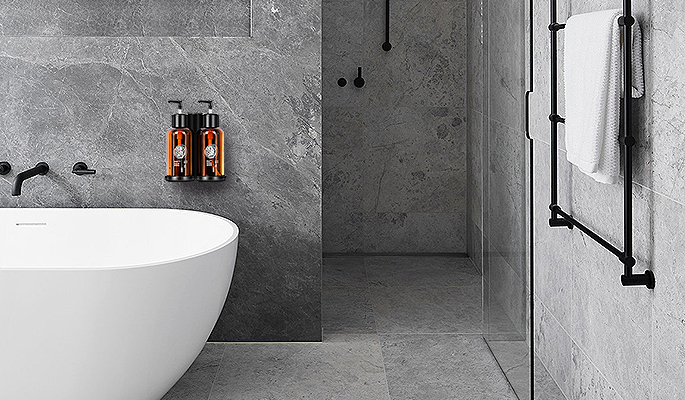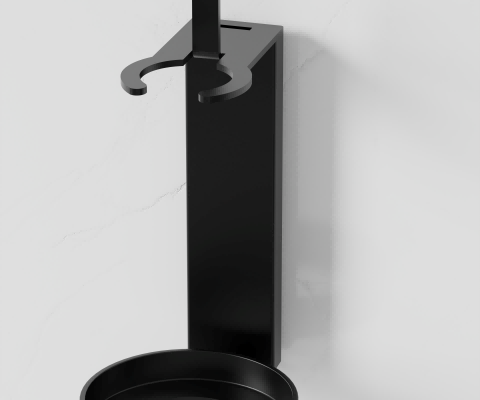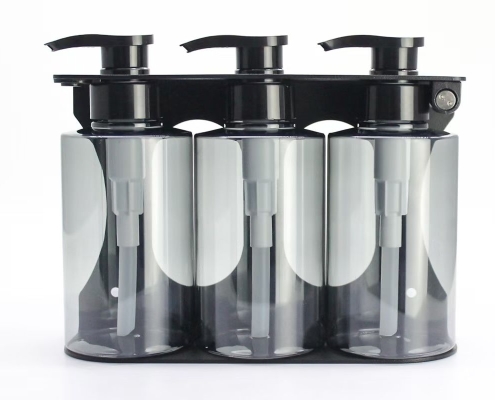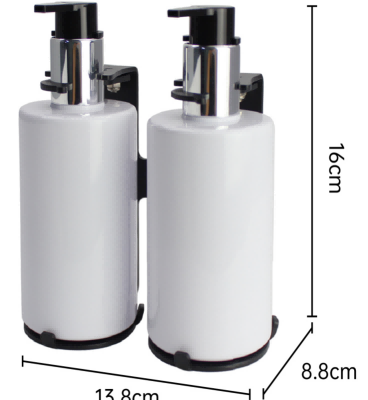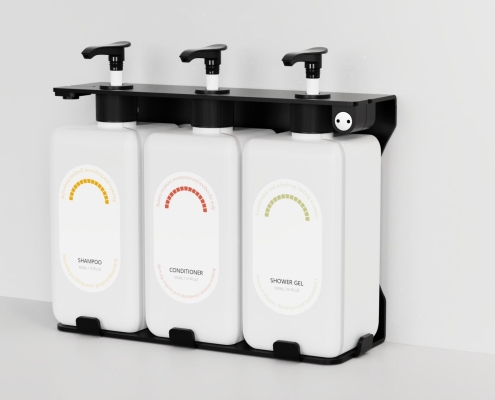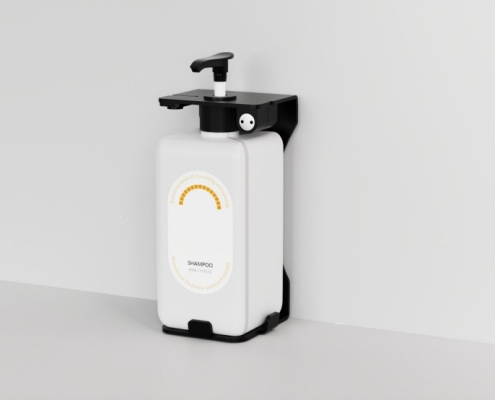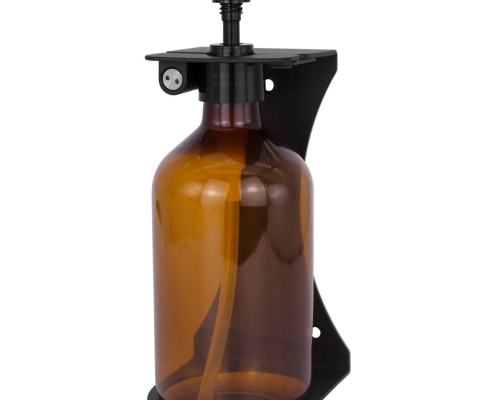In the often-overlooked world of hotel amenities, the humble soap dispenser plays a surprisingly vital role. It’s a daily touchpoint for guests, silently communicating standards of hygiene, luxury, and environmental awareness. Selecting the right core material – stainless steel, ABS plastic, or ceramic – isn’t just about aesthetics; it impacts durability, hygiene, guest perception, operational costs, and long-term sustainability. Let’s dissect these popular contenders to find the perfect fit for every hotel zone.
1. The Enduring Workhorse: Stainless Steel
-
Characteristics:
-
Durability King: Highly resistant to dents, scratches, impacts, and corrosion. Built to withstand the rigors of high-traffic areas and frequent cleaning.
-
Hygiene Champion: Non-porous surface prevents bacteria harborage. Naturally resistant to mold and mildew. Easily sterilized with harsh chemicals (bleach, strong disinfectants) without degradation.
-
Professional & Weighty: Conveys a strong sense of quality, cleanliness, and modernity. Its substantial weight feels premium and discourages tampering or theft.
-
Temperature Tolerant: Unaffected by hot water or steam during cleaning.
-
Sustainability Plus: Highly recyclable at end-of-life, appealing to eco-conscious operations.
-
-
Ideal Hotel Scenarios:
-
High-Traffic Public Restrooms: Lobbies, conference areas, restaurants, pools, gyms.
-
Back-of-House Areas: Staff washrooms, kitchens, laundry rooms.
-
Luxury/Contemporary Hotels: Where a sleek, professional, and durable image is paramount.
-
Outdoor/Wet Areas: Pool decks, spa changing rooms (ensure grade is truly rust-resistant, e.g., 304 or 316).
-
-
Care & Maintenance:
-
Daily/Regular: Wipe with a damp microfiber cloth and mild detergent or a dedicated stainless-steel cleaner. Always wipe with the grain to prevent micro-scratches.
-
Deep Cleaning/Disinfection: Use hospital-grade disinfectants or diluted bleach solutions. Rinse thoroughly and dry completely to prevent water spotting.
-
Avoid: Abrasive pads (steel wool, harsh scouring pads) – they cause permanent scratches. Chloride-based cleaners for prolonged periods can cause pitting on lower grades.
-
Tip: For stubborn water spots or light scratches, use specialized stainless-steel polishes. Apply a thin coat of mineral oil occasionally to protect the finish in humid areas.
-
2. The Versatile Performer: ABS Plastic
-
Characteristics:
-
Cost-Effective: Significantly cheaper to manufacture and purchase than metal or ceramic, ideal for bulk procurement or budget constraints.
-
Lightweight & Practical: Easy to install, handle, refill, and transport. Less likely to cause damage if dropped.
-
Design Flexibility: Can be molded into virtually any shape, size, or color. Allows for brand-specific designs, ergonomic shapes, and vibrant aesthetics. Easily incorporates translucent sections for level checks.
-
Impact Resistant: Good resistance to chipping and breaking from drops (though can crack under severe force).
-
Chemical Resistance (Generally): Resists many common cleaning agents.
-
-
Ideal Hotel Scenarios:
-
Economy/Mid-Scale Guestrooms: Where budget and functionality are key.
-
Limited-Stay Accommodations: Hostels, budget motels, extended-stay suites.
-
Family-Friendly Areas/Kids’ Clubs: Lightweight and less damaging if knocked over.
-
Temporary or Seasonal Installations: Pop-up hotels, event spaces.
-
Areas Requiring Specific Branding/Color: Themed rooms, promotional setups.
-
-
Care & Maintenance:
-
Daily/Regular: Wipe with a soft cloth dampened with mild soapy water or a gentle all-purpose cleaner.
-
Disinfection: Use disinfectants compatible with plastics (check manufacturer guidelines). Avoid chlorine bleach for prolonged periods as it can degrade the plastic, cause yellowing, or weaken it over time. Isopropyl alcohol (70%) is usually safe and effective.
-
Avoid: Harsh solvents (acetone, strong paint thinners), abrasive cleaners, scouring pads, and excessive heat (dishwashers, very hot water) which can warp, scratch, craze, or discolor the plastic.
-
Tip: UV exposure can cause fading or brittleness over time. Consider this for dispensers near windows. Replace if significant cracking, crazing, or deep scratches appear, as these can harbor bacteria.
-
3. The Touch of Elegance: Ceramic
-
Characteristics:
-
Luxury & Aesthetics: Unmatched in conveying classic elegance, sophistication, and a spa-like ambiance. High-quality glazes offer beautiful finishes and colors.
-
Weight & Stability: Substantial weight provides a premium feel and good stability.
-
Cool Touch: The inherent coolness can feel pleasant and luxurious.
-
Chemical Resistance (Glazed Surface): The glazed surface is non-porous, easy to wipe clean, and resistant to most common cleaning chemicals.
-
-
Ideal Hotel Scenarios:
-
Luxury Suites & High-End Boutique Hotels: Where creating a unique, opulent bathroom experience is crucial.
-
Spa & Wellness Areas: Enhances the serene, pampering atmosphere.
-
Fine Dining Restaurant Restrooms: Complements an upscale dining ambiance.
-
Heritage/Classic Style Hotels: Matches traditional decor beautifully.
-
-
Care & Maintenance:
-
Daily/Regular: Wipe gently with a soft, damp cloth and mild detergent. Dry thoroughly.
-
Disinfection: Use gentle disinfectants suitable for ceramics. Avoid abrasive cleaners or pads that can scratch the glaze. Bleach is generally safe on glazed surfaces but rinse well.
-
Handle with Extreme Care: This is the critical factor. Ceramic is inherently brittle and highly susceptible to chipping, cracking, or shattering if dropped, knocked hard, or impacted.
-
Avoid: Sudden temperature changes (e.g., pouring boiling water into a cold dispenser) which can cause thermal shock and cracking. Harsh mechanical impact.
-
Tip: Ensure secure mounting. Refill carefully to avoid hitting the rim. Consider protective bumpers or placement away from high-risk bump zones. Inspect regularly for hairline cracks or chips – these compromise hygiene and structural integrity.
-
The Verdict: Material Matters Beyond Looks
Choosing the right soap dispenser material is a strategic decision impacting guest experience, operational efficiency, and your bottom line:
-
Stainless Steel reigns supreme for unbeatable durability, hygiene, and a modern professional look in demanding public and back-of-house areas. Its longevity often justifies the higher upfront cost.
-
ABS Plastic offers unbeatable value, design freedom, and practicality for guestrooms (especially budget-conscious) and areas where weight or frequent replacement is a factor. Vigilance against wear and chemical degradation is key.
-
Ceramic delivers unparalleled luxury and aesthetic appeal for high-end suites, spas, and restaurants, creating a memorable sensory experience. However, its fragility demands careful handling, placement, and a higher tolerance for potential replacement costs.
Smart Care = Longevity & Hygiene: Regardless of material, consistent and appropriate cleaning is non-negotiable for guest safety and dispenser lifespan. Train housekeeping staff specifically on the dos and don’ts for each material type used in your property.
By understanding the inherent strengths, weaknesses, and care requirements of stainless steel, ABS plastic, and ceramic, hoteliers can make informed decisions that elevate the guest bathroom experience, optimize operational costs, and project the desired brand image – one thoughtful dispenser at a time. Investing in the right material isn’t just about holding soap; it’s about holding up your standards.

